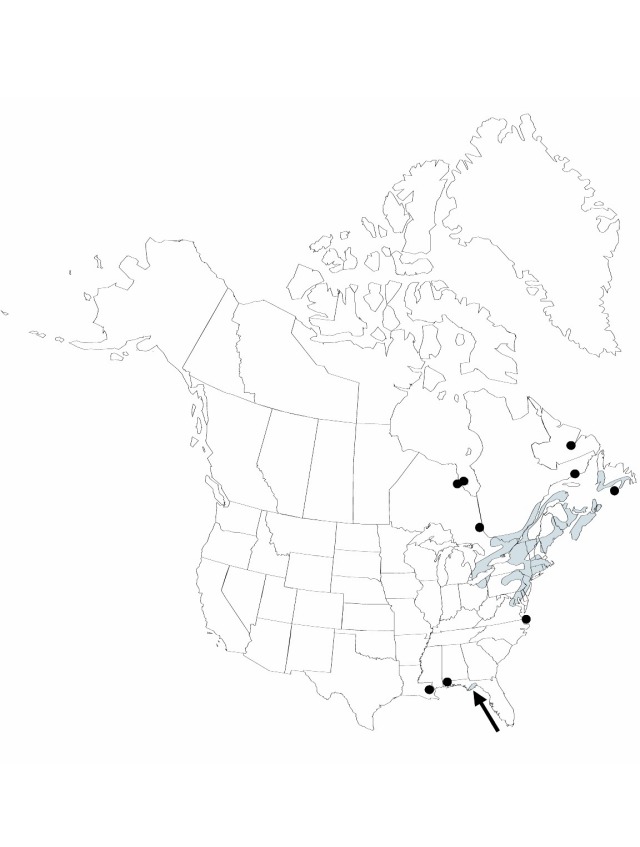Difference between revisions of "Potamogeton perfoliatus"
Sp. Pl. 1: 126. 1753 (as perfoliatum).
FNA>Volume Importer |
FNA>Volume Importer |
||
| Line 23: | Line 23: | ||
|elevation=0–100 m | |elevation=0–100 m | ||
|distribution=Greenland;St. Pierre and Miquelon;N.B.;Nfld. and Labr.;N.S.;Ont.;P.E.I.;Que.;Ala.;Conn.;Del.;D.C.;Fla.;La.;Maine;Md.;Mass.;N.H.;N.J.;N.Y.;N.C.;Ohio;Pa.;R.I.;Vt.;Va.;Central America (Guatemala);Eurasia;Africa;Australia. | |distribution=Greenland;St. Pierre and Miquelon;N.B.;Nfld. and Labr.;N.S.;Ont.;P.E.I.;Que.;Ala.;Conn.;Del.;D.C.;Fla.;La.;Maine;Md.;Mass.;N.H.;N.J.;N.Y.;N.C.;Ohio;Pa.;R.I.;Vt.;Va.;Central America (Guatemala);Eurasia;Africa;Australia. | ||
| − | |discussion=<p>Four hybrids, Potamogeton perfoliatus × P. praelongus (= P. × cognatus Ascherson & Graebner), P. perfoliatus × P. pusillus (= P. × mysticus Morong), P. gramineus × P. perfoliatus (= P. × nitens Weber [P. × subnitens Hagström]), and P. alpinus × P. perfoliatus (= P. × prussicus Hagström), have been described.</p> | + | |discussion=<p>Four hybrids, <i>Potamogeton perfoliatus</i> × <i>P. praelongus</i> (= P. × cognatus Ascherson & Graebner), <i>P. perfoliatus</i> × <i>P. pusillus</i> (= P. × mysticus Morong), <i>P. gramineus</i> × <i>P. perfoliatus</i> (= P. × nitens Weber [P. × subnitens Hagström]), and <i>P. alpinus</i> × <i>P. perfoliatus</i> (= P. × prussicus Hagström), have been described.</p> |
|tables= | |tables= | ||
|references= | |references= | ||
| Line 47: | Line 47: | ||
|publication year= | |publication year= | ||
|special status= | |special status= | ||
| − | |source xml=https://jpend@bitbucket.org/aafc-mbb/fna-data-curation.git/src/ | + | |source xml=https://jpend@bitbucket.org/aafc-mbb/fna-data-curation.git/src/8f726806613d60c220dc4493de13607dd3150896/coarse_grained_fna_xml/V22/V22_386.xml |
|genus=Potamogeton | |genus=Potamogeton | ||
|species=Potamogeton perfoliatus | |species=Potamogeton perfoliatus | ||
Revision as of 15:58, 18 September 2019
Rhizomes present. Cauline stems terete, without spots, to 250 cm; nodal glands absent. Turions absent. Leaves submersed, ± spirally arranged, sessile, lax; stipules deteriorating into fibers and deciduous, inconspicuous (absent on proximal portion of stem), convolute, free from blade, light brown to green, not ligulate, 3.5–6.5 cm, not fibrous, not shredding at apex; blade olive-green, broadly lanceolate, orbiculate, or ovate, not arcuate, 0.9–7.6(–9.7) cm × 7–40 mm, base rounded, without basal lobes, clasping, margins entire, often crispate, apex not hoodlike, not splitting when pressed, round, rarely acute; veins 3–25. Inflorescences unbranched, emersed; peduncles not dimorphic, terminal or axillary, erect to rarely recurved, cylindric, 1–7.3 cm; spike not dimorphic, cylindric, 0.4–4.8 cm. Fruits sessile, greenish brown to olive-green, obovoid, turgid or rarely concave, not abaxially or laterally keeled, 1.6–3 × 1.3–2.2 mm; beak erect, 0.4–0.6 mm; sides without basal tubercles; embryo with 1 full spiral. 2n = 52.
Phenology: Flowering summer–fall.
Habitat: Waters, often brackish, of lakes, streams, rivers, and bays
Elevation: 0–100 m
Distribution

Greenland, St. Pierre and Miquelon, N.B., Nfld. and Labr., N.S., Ont., P.E.I., Que., Ala., Conn., Del., D.C., Fla., La., Maine, Md., Mass., N.H., N.J., N.Y., N.C., Ohio, Pa., R.I., Vt., Va., Central America (Guatemala), Eurasia, Africa, Australia.
Discussion
Four hybrids, Potamogeton perfoliatus × P. praelongus (= P. × cognatus Ascherson & Graebner), P. perfoliatus × P. pusillus (= P. × mysticus Morong), P. gramineus × P. perfoliatus (= P. × nitens Weber [P. × subnitens Hagström]), and P. alpinus × P. perfoliatus (= P. × prussicus Hagström), have been described.
Selected References
None.